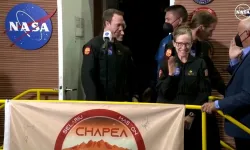The first US attempt to soft-land on the Moon in more than 50 years is in limbo after a fuel leak on a spacecraft from a private company called Astrobotic Technology.
A statement from the Pittsburgh-based aerospace company said that after Monday's launch, the spacecraft, named "Peregrine", was communicating, all systems were turned on and began operating as designed.
However, it soon became clear that there was a "critical fuel loss", which (possibly) scuttled plans to land on the Moon on February 23.
The company made another statement late Monday, saying that the leak was continuing and that it was estimated that the lander would start losing solar power in about 40 hours.
It was also reported that the spacecraft experienced an "anomaly" that prevented the solar panels from pointing steadily towards the Sun.
It was reported that the company's engineers were evaluating the problem, which they described as a "failure in the propulsion system", while the solar panel managed to orient the lander towards the sun so that it could collect sunlight and charge its battery.
Aviation experts point out that it would not be possible for Peregrine to fulfill its mission without the ability to charge batteries with solar energy.
In a statement made by the US National Aeronautics and Space Agency (NASA), it was reported that the spacecraft named "Peregrine", which was launched for landing on the Moon as part of the "Commercial Lunar Payload Services (CLPS) Program", faced a technical problem.
On the other hand, it is stated that the Peregrine spacecraft is programmed to have the power to protect itself during technical failures and to communicate with the Earth.
Astrobotic reported that the propulsion system problem "threatens the spacecraft's ability to make a soft landing on the Moon". The lander is equipped with engines and thrusters to maneuver not only during the journey to the Moon but also during the landing.
The "Vulcan Centaur" rocket carrying the "Peregrine" lunar lander developed by the United Launch Alliance (ULA), a joint venture between Boeing and Lockheed Martin, was launched yesterday morning (January 8) from the Cape Canaveral Space Station in Florida, USA.















